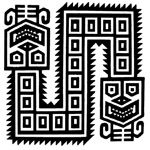Center, Textile Research

PreColumbian Textile Conference VII / Jornadas de Textiles PreColombinos VII (2016)
Date of this Version
11-13-2017
Document Type
Article
Citation
In PreColumbian Textile Conference VII / Jornadas de Textiles PreColombinos VII, ed. Lena Bjerregaard and Ann Peters (Lincoln, NE: Zea Books, 2017), pp. 361–386
doi:10.13014/K2959FR7
Abstract
Una gran parte de los antiguos textiles peruanos muestra imágenes divinas en muchas variaciones. Estos se complementan con el simbolismo religioso de la fertilidad, que se presenta en tres alternativas diferentes y muchas variaciones. Algunas culturas también utilizaron imágenes emblemáticas divinas. En la costa del ave marina tenía un estatus casi divino, que se expresa en muchos tejidos. Textiles de las culturas del norte y del sur se acogieron al contenido de las formas de Chavín, pero encontraron sus propias variaciones. Murales, relieves, joyas y otros objetos que contienen la misma información que los textiles. La sociedad del antiguo Perú era más de dos milenios y medio influenciado religiosamente por este simbolismo. Los sacerdotes creados con la imagen divina y sus requisitos de simbolismo para las prácticas de ingeniería agrícola y la agricultura en un entorno de gran complejidad. Este medio de vida exitoso fue el origen del desarrollo de las civilizaciones peruanas.
The divine image and the religious symbolism in textiles of ancient Peru
Abstract -- A large part of the ancient Peruvian textiles shows images of the gods in many variations. These are supplemented by the religious symbolism of fertility, which is presented in three different alterations and many variations. Some cultures also used emblematic images of the gods. On the coast the sea bird had an almost divine status, which is expressed in many textiles. Textiles of the cultures of the North and the South availed themselves of the content of forms of Chavín, but they found their own variations. Murals, reliefs, jewelry and other objects are containing the same information as the textiles. The society of ancient Peru was more than two and a half millennia religiously influenced by this symbolism. The priests created with the divine image and its symbolism requirements for agricultural engineering practices in this highly complex environment. This successful livelihood was the origin of the development of the high ranking Peruvian civilizations.
Included in
Art and Materials Conservation Commons, Chicana/o Studies Commons, Fiber, Textile, and Weaving Arts Commons, Indigenous Studies Commons, Latina/o Studies Commons, Museum Studies Commons, Other History of Art, Architecture, and Archaeology Commons, Other Languages, Societies, and Cultures Commons


Comments
Copyright © 2017 by the author.